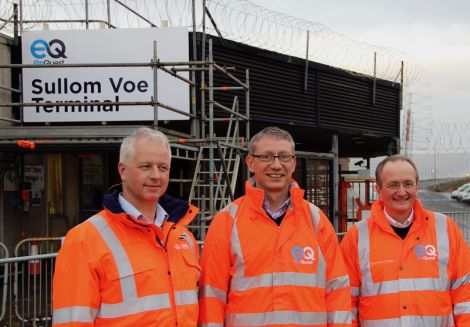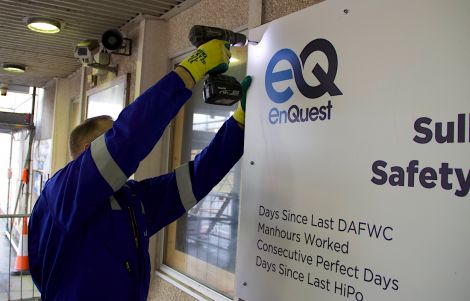News / EnQuest takes charge of Sullom Voe Terminal
SHETLAND’s long association with oil company BP as operator of the Sullom Voe Terminal (SVT) which has spanned nearly 40 years is ending today (Friday) as EnQuest takes charge.
The sale of 25 per cent of the Magnus field, and an additional three per cent interest in the terminal to the company specialised in managing mature oil assets and extending their life, was announced in January.
The company said that more than 300 staff working at Magnus, SVT and in the Aberdeen office have now become EnQuest employees.
The move marks an end of an era for Shetland that was initially meant to last only until the end of the last century.
But improved technology to extract oil from existing wells plus new finds in the east of Shetland basin, as well as to the west of the isles, means that the Shetland’s oil era is continuing well into the 21st century.
As such, the handover from BP to EnQuest is seen as an opportunity for winning new business for the terminal by making it more competitive.
Councillor for the area and chairman of the council’s development committee Alastair Cooper said EnQuest appeared to be committed “to setting Sullom Voe back on its feet again”.
“I think the challenge for EnQuest is to actually reconfigure Sullom Voe so that the unit costs are such that it attracts new business, because that is what BP has failed to do for a number of years,” he said.
“There will be pain in the early days, but I would like to believe that there’ll come a point when it’ll tip, and they will get more volume in, and with more volume the likelihood of stopping the drain of jobs and kit, and hopefully maybe increasing again.”
EnQuest said the acquisition further enhances its position as one of the largest UK independent oil producers in the UK North Sea, and it now operates assets across seven production hubs in the UK.
Become a member of Shetland News
EnQuest is now the single biggest shipper at the terminal, which handles around a third of the company’s overall North Sea production.
Visiting the terminal on Friday, EnQuest’s chief operating officer Neil McCulloch,said the transaction was very much in the spirit of what is termed ‘maximising economic recovery’ (MER), “ensuring that the right assets are in the right hands”
He said: “EnQuest, as operator, brings proven expertise in increasing production on mature assets through drilling and well work.
“This transaction signals the beginning of a new chapter in the life of Magnus.
“SVT is a key asset for EnQuest, our industry and the UKCS and is strategically positioned to support East and West of Shetland fields both now and in the future.
“This critical infrastructure will further benefit from EnQuest’s experience in managing late life assets, combined with the skills and expertise of the existing SVT team.”
He added that EnQuest was committed to collaborating with the other SVT owners and Shetland Islands Council to explore new business opportunities and thus maximise the long-term value of the terminal.
Looking back, councillor Cooper said the isles’ relationship with BP had not always been easy but overall had been a positive experience.
“BP has been good for Shetland because, in fairness to them, they’ve recognised that they’re in a very sensitive marine environment.
“They’ve done what’s required to keep Sullom Voe safe for 40 years now. We have a healthy seafood sector, and if Sullom Voe were not environmentally aware that could be very much affected.”
And referring to the only large oil spill to ever happen at the terminal on 30 December 1978, Cooper said BP quickly learned the lessons.
“Going back, and with hindsight, the Esso Bernicia spill was one of the best things that happened, right in the early stages.
“BP recognised at that point the damage that was done to their company profile and to the environment, and they put in place measures to make sure it never happened again, and it didn’t happen again, thankfully.
And looking into the future he hopes the new operator will reconsider the current arrangement of having many of the terminal’s staff commuting between the Scottish mainland and Shetland, and ultimately go back to domiciled staff.
“From my role in economic development, I would want to see as many of the jobs actually domiciled here in Shetland and the folk contributing to the local economy,” Cooper said.
“Mossbank and Brae schools could take a lot more bairns, but then the reality is the folk will probably want to live in Lerwick,” he said.
Become a member of Shetland News
Shetland News is asking its readers to consider paying for membership to get additional perks:
- Removal of third-party ads;
- Bookmark posts to read later;
- Exclusive curated weekly newsletter;
- Hide membership messages;
- Comments open for discussion.
If you appreciate what we do and feel strongly about impartial local journalism, then please become a member of Shetland News by either making a single payment, or setting up a monthly, quarterly or yearly subscription.






























































